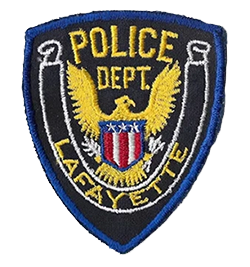Lafayette (IN) Police Department | 2023 Officer Wellness Executive Summary
Lafayette (IN) Police Department
State: IN

PDF Resource
Lafayette (IN) Police Department | 2023 Officer Wellness Executive Summary2023 General Officer Safety Winner
2023 Officer Wellness Finalist
The City of Lafayette, Indiana, is a community located in Tippecanoe County and has an estimated population of 74,545 residents. Located directly across the Wabash River is Purdue University. Established in 1825, the Lafayette Police Department has grown to 152 Sworn Officers supported by a civilian staff of 50 employees.
GENERAL OFFICER SAFETY
New officers must participate in an 8-week in-house training program in addition to the Indiana Law Enforcement Academy. This in-house program covers department expectations, policy, law, standard operating procedures, firearms training, defensive tactics, emergency vehicle operator course training (EVOC), and other blocks of instruction pertinent to their career. All officers are required to complete a four-phase field training program before going on their own.
In 2012 the Lafayette Police Department modified their standard uniform of the day to include an outer vest carrier with a Molle system to help displace the load created by heavy leather duty belts. This move was intended to address lower back and knee problems suffered by many officers due to equipment traditionally located around the lower back and hip areas. In addition to standard duty equipment, officers also carry on their person, an Apple iPhone, Axon body worn camera with live stream, and a tactical medical kit to include a tourniquet, chest seal and Quick Clot. LPD receives annual training on the “stop the bleed” and tactical medicine for patrol officers from local emergency medical providers. Every officer is also issued Narcan which has resulted in numerous saves.
Last year the Department received $7000 for new and replacement bulletproof vests. The funding comes from the Departments participation in the Patrick Leahy Bulletproof Vest Partnership federal grant program administered by the Bureau of Justice Assistance (BJA). Officers, per policy, are required to always wear their custom fitted vests while in uniform. Vests are replaced every five years.
Patrol vehicles are equipped with patrol rifles outfitted with Red Dot Optic sites and 5 spare magazines. Rifles are secured in all vehicles within a quick release storage rack. Vehicles contain high visibility vests for traffic control, mobile computer terminals, Axon Fleet 3 dashcam video systems, and less lethal shotgun with bean bag and 40mm foam munitions. The Department ensures that each shift has adequate less lethal coverage as only certain vehicles contain shotguns and munitions. All officers are trained in the less lethal option. Officers attend range training monthly and are required to qualify annually.
LPD Supervisor are required to review Axon camera footage two times per month, selecting a video depicting proper use of policy and tactics and a second to be used as a learning opportunity. This policy led to changes in handcuffing procedures after numerous preventable use-of-force incidents were studied by defensive tactics subject matter experts.
LPD mandates a minimum of four hours of E.V.O.C. training. The Department has access to a 2.5-mile test track through its partnership with Subaru Isuzu of Indiana. Once a year the track is opened to LPD to train their officers in emergency driver operations.
Patrol Vehicles have been outfitted with extra-side and rear strobes to create a 360-degree safety illumination bubble for traffic-stops, crashes, and incident scene safety. In addition to high visibility traffic vests officers are provided attachments for their portable flashlights for traffic direction activities.
The Lafayette Police Department Special Weapons and Tactics (SWAT) team trains 12 to 16 hours monthly, in keeping with standards set by the National Tactical Officers Association (NTOA). In 2021 six operators represented the team during the Indiana SWAT Challenge, placing first overall. This was the teams 4th consecutive Indiana SWAT Challenge championship.
The SWAT team utilizes an extensive qualification process that requires mandatory fitness and firearms qualification scores. These are re-tested bi-annually. All team members are outfitted with level III full-coverage kit, including throat, groin, bicep, and more with rifle plates, in addition to ballistic helmets. They also issued chemical masks and gear. The Lafayette SWAT team assists with training other officers and recruits at LPD. Team members are certified instructors in firearms (handgun and rifle), active shooter response, defensive tactics, building searches, and response to critical situations. The Team trains with other specialty units in the department, including the Drone team, K9 (Metro K9), and Crisis Negotiations Team (CNT).
Officers attached to the Crisis Negotiation Team attend the F.B.I.’s Basic Crisis Negotiation Course. On going training includes classroom, scenario-based training in the field, and joint training with the Lafayette Police Department SWAT team. The team, by policy, is deployed on every SWAT callout in addition to their regular activations. LPD strives to have all officers, including those assigned to the Negotiation Team, trained as Crisis Intervention Officers (CIT). Partnering with the National Alliance on Mental Illness (NAMI) the Department has approximately 80% of their officer CIT trained.
LPD conducts active shooter training, utilizing SWAT officers trained in active shooter response procedures. School Resource Officers (SRO) receive additional training in the federal endorsed safety protocol, ALICE.
The LPD Drone Response Team, created in 2019, consists of two DJI Inspire drones, equipped with FLIR Optical Zoom cameras and two Mavics Drones. All drone pilots are F.A.A. certified. The Program also utilizes Axon Air, a live-stream capability integrating our drone program into our Axon Respond network. This technology enhances officer safety by providing aerial views, low-light, and thermal imaging capabilities when required.
In 2021 the Lafayette Police Department was the first department in Indiana, and one of the first in the country, to pilot a peak performance program developed by Performance Protocol. This training company, based in Arizona, is a digital coaching platform that takes experienced law enforcement officers, trainers, and executives and trains them to work with law enforcement officers. All Performance Protocol Coaches are proven subject matter experts who have demonstrated success in their own lives.
The Lafayette Police Department moved from a 5-on 2-off, 8-hour work shift to a 3-on 3-off, 2-on 2-off, 12-hour shift. This change occurred in 2008 after a comprehensive patrol allocation study was completed. This change benefited operational capacity, but the primary driver was improving officer wellness by providing more continuous time off and building training time into their monthly work schedule.
VIEW FULL SUMMARY | DOWNLOAD PDF
OFFICER WELLNESS
The City of Lafayette, Indiana, is home to Purdue University and the Lafayette Police Department. The police department focuses on supporting its officers’ well-being through various programs:
- Police Chaplain Program: Established since the mid-1990s, this program offers support to officers and their families during times of crisis or trauma. Dr. Will Miller, a psychologist, professor at Purdue University, and comedian, educates families about the challenges officers face and provides Dr. Kevin Gilmartin’s book, “Emotional Survival for Law Enforcement.”
- Emotional Wellness and Employee Assistance Programs: The City of Lafayette and the Lafayette Police Department partner with Dr. Kelly Dardeen and Suncrest Psychological Services, specializing in first responder support. This includes counseling, coping mechanisms, and addressing mental health or substance abuse issues.
- Critical Incident Debriefs: Dr. Dardeen is available for debriefing sessions, especially after traumatic events like officer-involved shootings or child death investigations.
- Nutrition and Fitness: The department promotes nutrition awareness, fitness, and overall wellness among officers. The chief learned about the importance of nutrition and fitness in law enforcement, and the department offers wellness exams and bi-annual fitness assessments. They also have a gym open to officers and their families.
- O2X Wellness Program: In 2020, the department contracted with O2X to provide customized wellness programs, including coaching on nutrition, exercise, meditation, and holistic wellness.
These programs aim to improve officer well-being, reduce stress, prevent burnout, and enhance job performance while eliminating barriers to engagement. The department’s commitment to officer wellness encompasses physical, emotional, and mental health, ultimately creating a healthier and more effective police force.
This summary is only a brief overview of many of the agency’s programs. In the actual submission you will see that the agency has other programs and incentives to benefit its members. Please review their entire submission and its associated documents to gain a complete understanding of their program.



